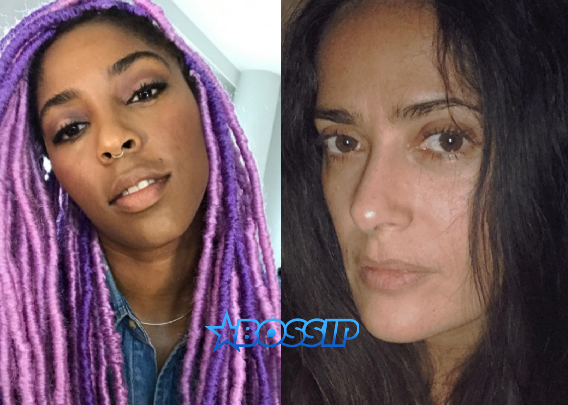Salma Hayek Apologizes For Shutting Down Jessica Williams
Former Daily Show correspondent and actress Jessica Williams recently made headlines for trying to help her white peers in Hollywood how to empathize with problems black women face in Trump’s new America. Unfortunately for her, actresses Salma Hayek and Shirley MacLaine only wanted to shut her up and tear down her issues.
The discussion took place during Sundance at a woman’s empowerment lunch for some of Hollywood’s biggest names. According to the LA Times, the conversation took a nasty turn when the non-black actresses attempted to control the conversation about race.
“I have a question for you,” Williams, 27, said to MacLaine. “My question is: What if you are a person of color, or a transgendered person who — just from how you look — you already are in a conflict?”
“Right, but change your point of view,” MacLaine offered. “Change your point of view of being victimized. I’m saying: Find the democracy inside.”
“I’m sorry,” Hayek said, jumping in. “Can I ask you a question?”
“Yes, ma’am,” Williams answered.
“Who are you when you’re not black and you’re not a woman? Who are you and what have you got to give?”
Williams took a deep breath. “A lot. But some days, I’m just black, and I’m just a woman,” she said. “Like, it’s not my choice. I know who I am. I know I’m Jessica, and I’m the hottest b*tch on the planet I know.”
Hayek then shut down Willams:
“No, no, no,” Hayek said. “Take the time to investigate. That’s the trap! …There is so much more.”
“Right,” agreed MacClaine. “The more is inside.”
Williams, whose speech at the women’s march at Sundance was praised as one of the most powerful and effective last week, looked down and said she was struggling to articulate herself. Peirce tried to help her, saying that when she goes out in public looking masculine, she causes discomfort in a way Williams might as a black woman.
But that wasn’t quite right. So after a few moments of reflection, Williams returned to Hayek.
“I think what you’re saying is valid, but I also think that what you’re saying doesn’t apply to all women. I think that’s impossible.”
“What part of it is impossible?” Hayek responded. “You’re giving attention to how the other one feels.”
“Because I have to,” Williams said.
”If you have to do that, then do that,” Hayek said. “Then that’s your journey. But I want to inspire other people to know it’s a choice.”
Things continued to go left…
“I also feel like the word ‘victim’ — I feel like it has bothered me,” Williams replied. “When I talk about feminism, sometimes I feel like being a black woman is cast aside. I always feel like I’m warring with my womanhood and wanting the world to be better, and with my blackness — which is the opposite of whiteness.”
“With intersectional feminism, it’s our responsibility as white women to recognize that when there are people of color or people who are queer — we need to prioritize your voices and let you speak the loudest and learn from your experience, because we haven’t been listening. So please, Jessica, finish your thoughts.”
Williams, visibly uncomfortable, said she also wanted to encourage all of the women in the room to pay special attention to women of color and LGBT women. “I think we need to not speak over black women,” she said, “not assign them labels.”
“What does this mean, ‘speak over?’” Hayek asked.
“To project your ideas on me,” Williams said. “I think there is a fear that if we present an idea that, ‘Hey, maybe [black women] have it a little bit harder in this country’ — because we do; black women and trans women do — if we’re having it a little bit harder, it doesn’t invalidate your experience. I really am begging you to not take it personally.”
The comedian then referenced Planned Parenthood to support her argument. While many women may rely on the clinic, she said, four out of five women who use their services are women of color.
“So when you say women of color,” Hayek began. Then she noticed that Williams was not making eye contact with her. “Jessica, do you mind if I look at your eyes?”
Williams barely looked up. Still, the back-and-forth continued, with Hayek questioning whether or not she was considered a woman of color in Williams’ estimation. Nearly everyone in the room responded that Hayek was.
“Wouldn’t it solve it if women just all had each other’s backs in general?” Cora asked suddenly.
“Sure,” Peirce said. “The thing is this, yes, all women can work together, but we have to acknowledge that black women have a different experience. She’s here struggling and we keep shutting her down.”
“I don’t think anybody here shut her down,” Cora said, fighting back.
“Can I interrupt, because I feel misunderstood,” Hayek agreed. “It’s not shutting you up. I feel misunderstood on one point: We should be also curious about our brain. By being the best that you can be. That’s what I was trying to say to you. Let’s not just spend all the time in the anger, but in the investigation.”
“Baby, I’m Mexican and Arab,” she went on, addressing Williams. “I’m from another generation, baby, when this was not even a possibility. My generation, they said, ‘Go back to Mexico. You’ll never be anything other than a maid in this country.’ By the heads of studios! There was no movement. Latino women were not even anywhere near where you guys are. I was the first one. I’m 50 years old. So I understand.”
Jessica alluded to white Hollywood with this Instagram post:
Salema took to her Instagram to apologize for the comments and says she stands unified with all actors of color:
What do you think of the discussion?
IG









Comments
Bossip Comment Policy
Please read our Comment Policy before commenting.